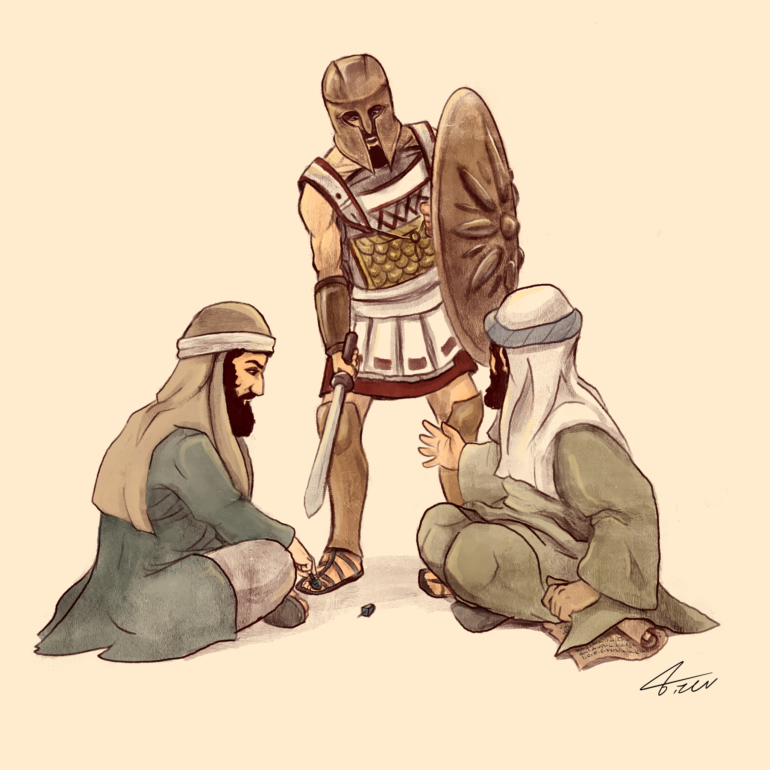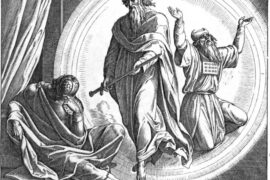The tenth chapter of a podcast series on the first Book of Maccabees.
For more content from VISION Magazine, subscribe to our newsletter and follow us on Twitter @VISION_Mag_, Facebook and YouTube. If you haven’t already, don’t forget to subscribe to our podcast on SoundCloud, iTunes, Stitcher, TuneIn, or Spotify and leave a rating and review to help us get our message out to a wider audience!
To support the podcast, head over to our PayPal portal and be sure to write a note that your contribution is for the podcast.
Hosted by: Robert Goodman
Transcript:
Shalom Aleikhem! And welcome back to Sefer Maccabim!
Last time we learned about the death of Yehuda HaMaccabi and how this almost brought the Maccabean revolt to its knees, but the people rallied around Yehuda’s brother Yehonatan who assumed the mantle of leadership and battled back to ensure the war would continue. We’re now going to start the next chapter by introducing a new character to our story named Alexander Balas.
Now Alexander Balas was a Greek citizen who claimed to be a long-lost son of Antiochus Epiphanes, the emperor this all began with, and thereby the rightful heir to the Seleucid throne. Scholars debate the authenticity of this claim, but after voicing it continuously Alexander built up a cadre of loyal supporters. He was taken to Rome where he petitioned the Senate to support him in his battle to overthrow Demetrius and become emperor. The Senate gave him their support, and officially recognized Alexander as the true Seleucid emperor.
Alexander recruited mercenaries, and chapter 10 in the Book of Maccabees begins by telling us how around fifteen years after the start of the Maccabean revolt, Alexander and his army sail to Judea and capture the city of Akko on the north coast, which becomes his base. He has no problem taking the city because, as Josephus tells us, the residents were fed up of living under Demetrius’s rule, since Demetrius was doing a really rubbish job as emperor. Therefore the people welcomed Alexander, a contender for the throne, with open arms.
Of course, as soon as Demetrius gets wind of what’s going on he immediately jumps to mobilize an army to crush Alexander before he can take over.
Now before they battle, both Demetrius and Alexander realize there is one key personality they have to win over; namely, Yehonatan HaMaccabi. The Maccabi faction is gaining strength again in Judea and Yehonatan has an army of hardened Jewish warriors at his command. Both Demetrius and Alexander know that whichever one of them Yehonatan chooses to side with will be the one who wins the war, and the Seleucid throne. So they both straight away send letters to Yehonatan attempting to win him over.
Demetrius is especially anxious to do this because he does not exactly have a clean track record when it comes to treating the Jews well. The letter he sends Yehonatan goes something like this:
“I grant you permission to raise an army and craft weapons for yourselves, and also all the Jewish hostages being held in the Acra I command to be released.” (Now when I read this I thought all the prisoners had already been released by order of Bacchides, but apparently some Torah Jews were still being held there.)
When Yehonatan receives this letter he is very happy, and gathers the entire people in the middle of Yerushalayim to read them the letter, deliberately making sure the Hellenists in the Acra are within earshot. When they hear Demetrius’s proclamation they are very afraid, and immediately hand over the Jewish boys being held captive there, whom Yehonatan returns to their parents.
Very happy, Yehonatan relocates from Mikhmas to Yerushalayim, and begins to repair the city which had been damaged by Alcimus and the unruly Jews following the death of Yehuda. You might remember from the previous chapter that when Bacchides returns to Jerusalem having been defeated by the Maccabim at the banks of the Jordan, he fortifies many Judean towns and fills them with mercenaries. But when all the mercenaries see Yehonatan back in Jerusalem apparently with the support of the emperor, they become afraid and most of them flee Judea to return to their own countries. Only in Beit Tzur do they remain.
Now when Alexander hears what Demetrius has offered Yehonatan, and all the battles he and his fighters waged against Demetrius and Bacchides, Alexander thinks, “There’s no one like Yehonatan, first of all he’s clearly a brilliant warrior, and secondly he has reason to hate Demetrius. I need him on my side, I’ll make him a better offer.”
So Alexander sends a letter to Yehonatan which went something like this:
“Greetings to Yonatan from your brother Alexander. We have heard about your great courage, and we would like to make a league of friendship with you. I hereby appoint you as high priest over your people, and to show you I am serious I have included a purple robe and a golden crown for you to wear. Please see the back of the packaging for the user instructions.” [Well, something like that]
Yehonatan is delighted with this gesture of friendship, and on the festival of Sukkot that year he dons the robe and crown and officiates as Kohen Gadol, the first time the Jews had had a Kohen Gadol since the death of Yehuda HaMaccabi four years previously.
Now when Demetrius hears about Alexander’s offer to Yehonatan and the latter accepting it, Demetrius is distraught, and says, “Why didn’t I act sooner? Why did I delay and give Alexander the chance to win Yonatan over to his side? I’ve got to have Yehonatan as my ally, I’ll make him an amazing offer.”
And in a rather comical gesture, Demetrius sends another letter to Yonatan which fills 22 verses in the Book of Maccabees, in which he attempts to butter up Yehonatan and promises him an incredulous amount of rewards to persuade him to become Demetrius’s ally.
The letter reads something like this:
“Greetings to Yehonatan and the people of the Jews; in the past you have remained loyal to us, and we are very grateful. If you continue to remain so, we will reward you exceedingly. Now I release you and your people from all the crown taxes you were forced to pay us, the share of the crops and fruit trees you had to deliver to us, I give up authority over Jerusalem and the Acra, I hereby release every Jewish prisoner held captive throughout my kingdom, and shall even ensure their cattle are returned to them, I grant complete religious freedom to all Jews, I give you the city of Akko as a gift, I will give fifteen thousand shekels from the royal treasury every year, and I will pay for the building and repairing of the Beit HaMikdash and all the towns in Judea.”
When Yehonatan and the Jews receive Demetrius’s letter, they laugh. Clearly Demetrius is desperate to win Yehonatan over to his side, and there’s nothing he isn’t willing to promise to achieve that, but not for one second do they take his extravagant promises seriously. This, don’t forget, is the same Demetrius who scolded Nikanor for failing to kill Yehuda HaMaccabi, the same Demetrius who after Nikanor’s defeat sends over twenty thousand soldiers into Judea to fight the Maccabim and succeed in killing Yehuda. And now he’s trying to win them over with this? They dismiss his ridiculous letter without a second glance. Alexander Balas, on the other hand, has no history of oppressing the Jews, and Yonatan and the people are perfectly happy to forge a league of friendship with him.
In the meantime, Alexander has raised a great army, which includes many soldiers who deserted the official Seleucid army to join him, and he engages Demetrius in battle. Josephus tells us the details of the battle: Demetrius fights courageously and slays many of Alexander’s soldiers, but as he gives chase to the rest of them, his horse carries him into a deep bog and gets stuck. As soon as the fleeing soldiers of Alexander see what happened, they turn back and throw their darts at Demetrius. Demetrius’s wounds prove too much for him, and he falls there on the battlefield. The battle is a victory for Alexander Balas who now finds himself as Seleucid Emperor.
Alexander’s first move is to make an alliance with Ptolemy king of Egypt by requesting to marry his daughter Cleopatra, and the Egyptian king agrees and comes to meet Alexander in Akko, where the marriage takes place. Alexander had written to Yehonatan to come and meet them, so Yehonatan visits Alexander and Ptolemy in Akko and brings them many expensive gifts.
Some Hellenist Jews tried to bad-mouth Yehonatan to the king, but Alexander would not hear of it. On the country, he clothes Yehonatan in royal purple and orders his servants to lead Yehonatan into the midst of the city and proclaim that no man may trouble or complain against him. When the Hellenists see the royal treatment Yehonatan is receiving, they scarper.
Alexander remains emperor for five years, and these years are really very good for Yehonatan and the Jews. Alexander is kind to Yehonatan, and treats him as the foremost of his friends.
Unfortunately, it doesn’t last. After five years a new contender for the Seleucid throne makes his appearance, and his name is – Demetrius.
See, when Demetrius was slain on the battlefield by Alexander’s soldiers, his son, also named Demetrius, fled to Crete, where he remained for five years. But now he’s returned to the Levant, and he’s set on reclaiming the throne. Alexander is very sorry to hear about this, and heads straight up to Antioch. Demetrius arrives and appoints a general named Apollonius in charge of his army. Apollonius camps with the army at Yavne on the coastal plain, and sends a rather intimidating message to Yehonatan:
“Why do you stay with your soldiers in the mountains? If you trust in your own strength, come down from the mountains and meet me here on the plain, and let our armies fight each other with real weapons and not stones, in a place where there is nowhere to flee to in defeat. And you shall realize you are unable to stand before us, for twice before we have defeated your fathers in their own land.”
Apollonius is essentially telling Yehonatan, “Don’t hide in the mountains like a coward. If you’re really so strong, come down into the open and we’ll see who’s stronger – and it won’t be you.”
Yehonatan is rather irritated by this ultimatum, and he and his brother Shimon swiftly assemble ten thousand men and march them westward out of Jerusalem down to Jaffa on the coast. The reason they choose that location is because Jaffa has a garrison of soldiers stationed there by Apollonius, and Yehonatan and Shimon want to neutralize the threat they represent. Initially the inhabitants of Jaffa shut the gates to them, but when Yehonatan orders a siege of the city, the inhabitants are afraid he will conquer the city and deal with them harshly, so they open the gates and Yehonatan is able to take Jaffa without a fight.
When news reaches Apollonius that Yehonatan has indeed come down to the coastal plain, he prepares an army of three thousand cavalry and eight thousand foot soldiers, and directs them to Ashdod, another coastal city a little south of Jaffa. From there, Apollonius leads them slowly northward towards Jaffa, deliberately taking his time, because he wants Yehonatan to think he is vulnerable and leave Jaffa to attack him on the plain. Apollonius wanted Yehonatan to come and fight him, because he secretly left a thousand cavalry hidden in a valley, instructing them to come up behind Yonatan’s troops when they meet Apollonius’s army on the plain, thereby giving the impression that the Jews were surrounded.
The ploy works; Yehonatan takes the bait and leads his troops south to Ashdod to meet Apollonius in battle, where the two sides engage. But Yehonatan is an outstanding battle commander, and when the horsemen emerge from behind to surround him, he keeps his cool. He orders his men to stand in a square formation, and part of his forces he hands over to Shimon, with the order to keep fighting the main army on the southern side, while he directs the Jews closest to the ambush on the northern side.
The horsemen were armed with copious darts, which they had intended to throw at the Jewish soldiers and pick them off one by one, but Yehonatan instructs his men to lock their shields and form a large wall to protect their bodies. They do so, and even though the enemies pepper them with darts from morning until late at night, none of them cause any damage, because they simply bounce off Yehonatan’s wall of shields. Once they run out of darts, Shimon, who perceives the enemy to be tired out, redoubles his assault and the Jews fall upon the enemy with renewed vigor.
Eventually the foot soldiers break ranks and run, and when the horsemen see the foot soldiers running they themselves flee too, and the whole enemy army end up scattered all over the plain. Yehonatan catches and slays many of them, and the rest flee to the temple of Dagon in Ashdod. But Yehonatan finds them there, and burns the temple together with all the surviving soldiers.
On that day the Jews slay eight thousand enemy soldiers.
Yehonatan leads his men to nearby Ashkelon, where the people emerge and give them many presents and kind words, and thus he returns to Jerusalem with a great many gifts.
The final event in chapter 10 is how word of Yehonatan’s victory over Apollonius reaches Alexander back in Antioch, who again sends Yehonatan various gifts, including a sash of gold, which apparently was a customary gift worn by friends of the king in those days.
He also gifts Yehonatan the city of Ekron on the plain.
That brings us to the end of chapter 10, in which five years have passed. Alexander Balas, who might or might not be the son of Antiochus Epiphanes, has overthrown Demetrius and greatly honored Yehonatan, Demetrius the son of Demetrius has arrived to reclaim his father’s throne, and his general Apollonius challenged Yehonatan to a battle on the plain in which Yehonatan more than proved his worth.
We’ll resume next time with chapter 11, in which Ptolemy king of Egypt, Alexander’s ally and father in law, will turn his back on him and conspire with Demetrius to unseat Alexander from the throne.





